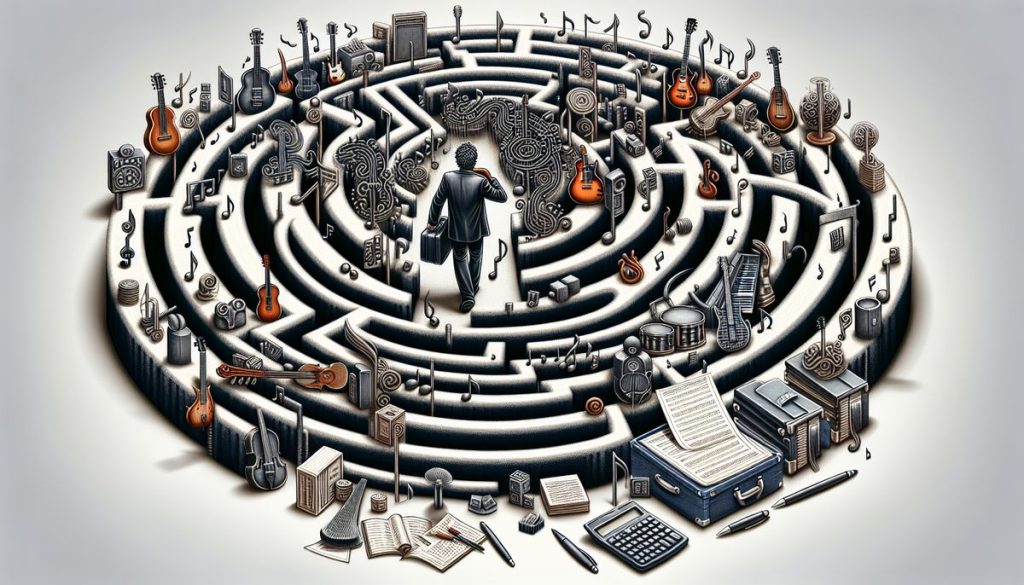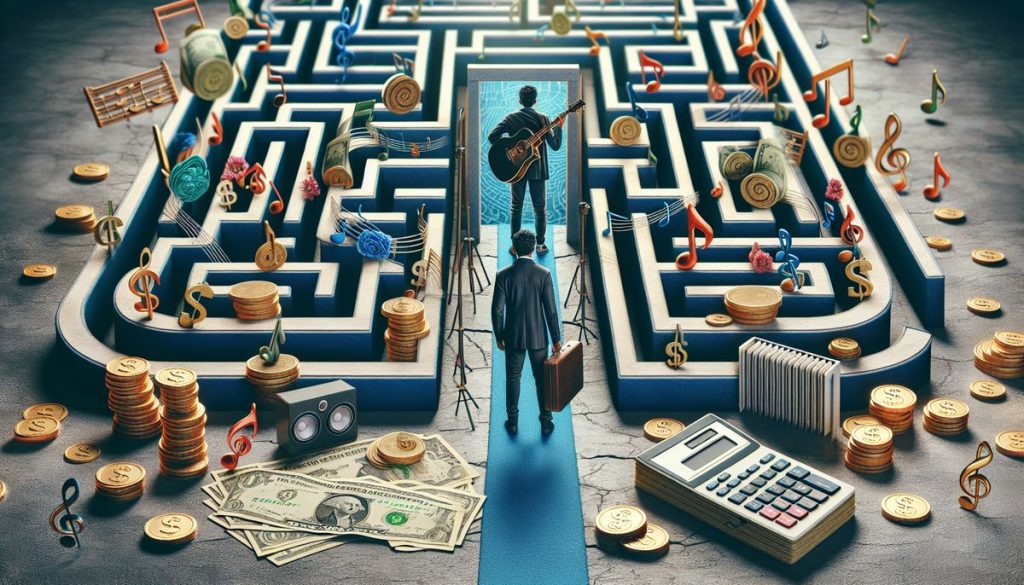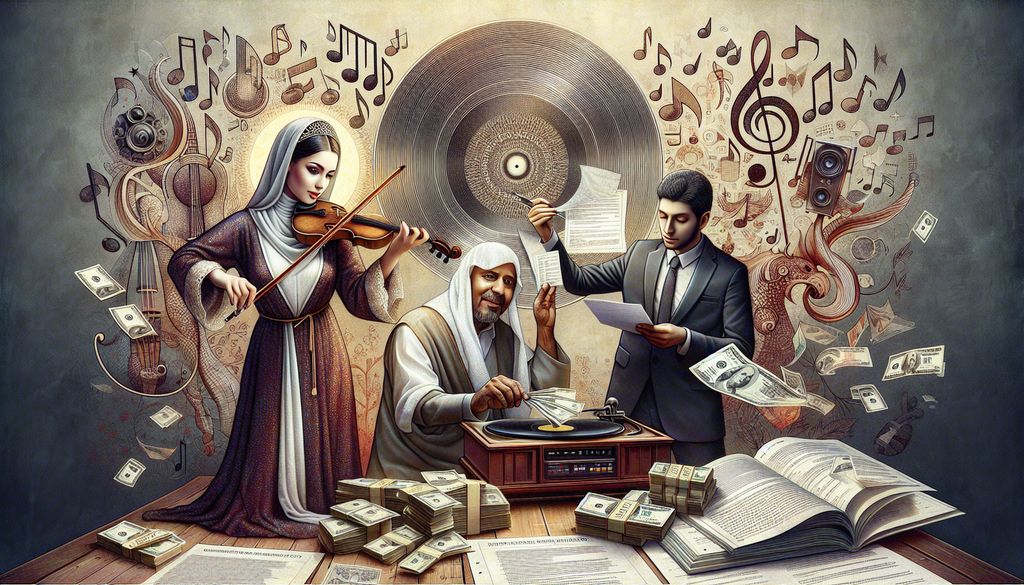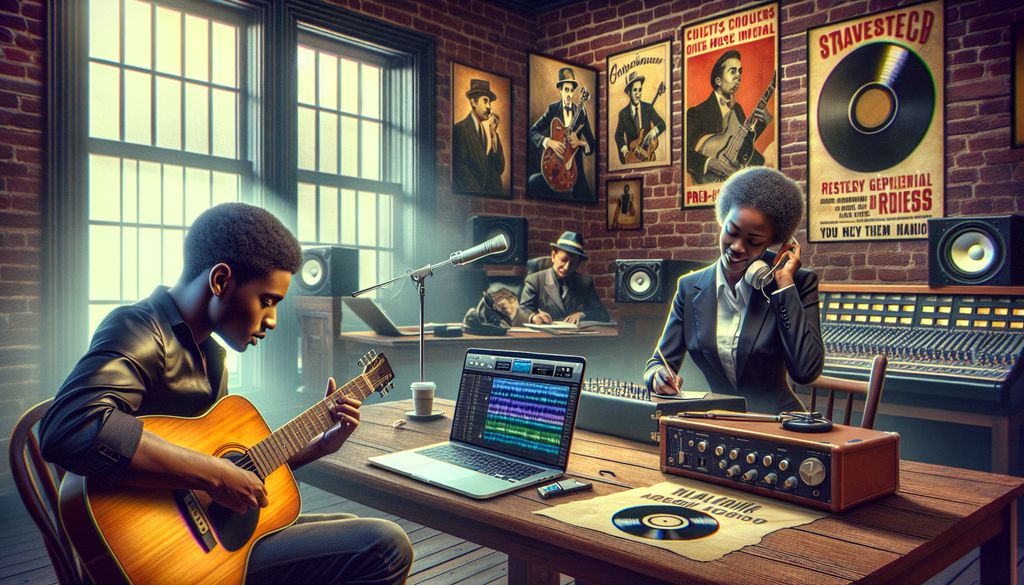Navigating Copyright and Trademark Law in the Modern Music Industry
Written by DJ Prodigee on Mon Jan, 2024
The modern music industry is a complex landscape of legal and copyright considerations, with a myriad of laws and regulations governing ownership, licensing, and protection of creative works. In this article, we will explore key aspects of copyright and trademark law as they pertain to the music industry, covering topics such as fair use, trademark protection, royalty distribution, digital streaming, music covers, and sync licensing. By delving into these areas, we aim to provide a comprehensive understanding of the legal framework that underpins the modern music industry.
Key Takeaways
- Understanding the basics of copyright and its application in the music industry is essential for artists and creators.
- Trademark protection is crucial for safeguarding the identity and branding of music acts and bands.
- Navigating royalty distribution and licensing in the digital age requires a nuanced understanding of music industry economics.
- Legal considerations for music covers, including copyright permissions and licensing, are vital for avoiding infringement.
- Sync licensing for film and TV presents lucrative opportunities for music placement, but requires careful negotiation and legal expertise.
Who Owns That Sick Beat? Understanding Copyright Basics
Copy-WHAT? Breaking Down Copyright Like You’re Five
Copyright law can be a bit confusing, but don’t worry, we’ll break it down for you like you’re five. So, here’s the deal: copyright gives creators the power to control who can copy, distribute, and make new stuff based on their work. It’s like having the ultimate ‘no touching’ sign on your masterpiece. But hey, it’s not all serious business. Check out this quick table to see what copyright covers:
| Copyright Covers | Not So Much |
|---|---|
| Music | Ideas |
| Art | Facts |
| Movies | Procedures |
And remember, copyright law is like a shape-shifter, always changing. So, keep your eyes peeled for updates and maybe take a crash course in copyright law like I did. It’s a wild ride, trust me! Oh, and one more thing: copyright doesn’t protect ideas, facts, or concepts, so keep those creative juices flowing without fear of the copyright police!
Now, go forth and create, my friends! Just make sure to give credit where credit is due. After all, we’re all in this creative chaos together.
Sampling, Covering, and Crying: The Do’s and Don’ts
So you want to sample that sick beat, huh? Well, before you go all DJ on us, remember that commercial use requires a sampling license from the sound recording copyright owner. And mash-ups? Not all of them are parodies, so be careful! Even if you think it’s fair use, the legal waters can get murky. Just ask Andy Warhol!
Fair Use or Fairly Confusing? Decoding the Legal Jargon
So, you’ve heard about this thing called fair use, right? It’s like the ‘get out of jail free’ card in Monopoly, but for copyright. Basically, it’s a way to use someone else’s work without getting in trouble. But here’s the kicker – it’s super tricky. You’ve got to prove that your use is transformative and not just a copycat move. And if that’s not confusing enough, there are four factors to consider. Yeah, it’s a whole thing. Here’s a quick breakdown:
- The purpose and character of your use
- The nature of the copyrighted work
- The amount and substantiality of the portion used
- The effect of your use on the potential market for the original work.
Remember, fair use isn’t a free pass to do whatever you want. It’s more like a permission slip with a bunch of fine print. So, before you go remixing that hot new track, make sure you’ve got your fair use facts straight!
Trademark Tango: Protecting Your Band’s Swagger
Your Band’s Name Isn’t ‘Free Real Estate’: Trademark 101
So you’ve come up with the perfect band name, huh? Well, guess what? You can’t just slap it on and call it a day. Trademark law is like a bouncer at a fancy club – it’s there to protect the cool kids and keep out the wannabes. If you want your band name to be the VIP of the music scene, you’ll need to trademark it. But before you dive headfirst into the legal mumbo jumbo, here are five things you need to know:
- Uniqueness: Your band name can’t be a copycat. It has to be as original as your music. No room for copycats in this town!
- Availability: Make sure your name isn’t already taken. You don’t want to crash someone else’s party, do you?
- Distinctiveness: Your band name should stand out like a rockstar in a crowd. No wallflowers allowed!
- Use in Commerce: It’s not just about looking good on paper. Your band name needs to hit the streets and make some noise.
- Protection: Once you’ve got that trademark, guard it like your last guitar pick. You never know who’s lurking in the shadows, waiting to steal your thunder.
Remember, trademarking your band name isn’t just a formality – it’s your backstage pass to the big leagues!
Merch Madness: When Your Face Ends Up on a Bootleg T-shirt
So, you’ve found your face on a bootleg t-shirt. It’s like looking in a funhouse mirror, but less flattering. Imagine seeing your rockstar grin distorted into a pixelated nightmare. Here’s a friendly reminder: not every license allows for merchandise. Many don’t even allow book covers over a certain number of sales. A lot of writers who are careless about such matters simply make an assumption that they have the right to use these things. They don’t. And to make matters worse, the licenses and terms change all the time. So if you go on, say, Dreamstime, to look at the license today for something you licensed in 2015, today’s license does not cover the 2015 download. What covers the 2015 download is the 2015 license that existed on the day you downloaded the art. Yes, some sites save their previous licenses, and some don’t. It’s a wild world out there, folks. Stay savvy and protect your face from the bootleg brigade!
Cease and Desist Disco: When Others Step on Your Trademark Toes
So, you’ve got your band’s name trademarked and you’re feeling pretty smug about it. But then, out of nowhere, someone else starts using it without your permission. Rude. This is like showing up to a party wearing the same outfit as someone else – awkward and totally not cool. If you find yourself in this situation, here’s what you can do:
- Send a Cease and Desist Letter: Politely tell them to back off and stop using your trademark. It’s like saying, "Hey, that’s mine. Hands off!"
- Take Legal Action: If they ignore your polite request, it’s time to bring out the big guns. Get a lawyer involved and show them who’s boss.
Remember, your trademark is your baby. Don’t let anyone mess with it!
The Remix Riddle: Who Gets Paid and How Much?
Mashups and Money: Counting Cash in the Remix Culture
AI-generated music has become ubiquitous in the modern music industry, raising questions about its legality. With the evolution of music creation tools, artists like Dustin Ballard are using AI to transform their vocals into those of other artists, creating mash-ups that catch the attention of celebrities. However, the legal implications of AI-generated music remain uncertain, and the potential for copyright infringement looms large. Despite the widespread use of AI in music creation, legal experts like the professor of digital and information law at Cornell Tech and Cornell Law School emphasize the importance of understanding royalties to protect rights and optimize earnings. This underscores the need for musicians to navigate the complex landscape of music royalties and ensure they are fairly compensated for their work. In the evolving music landscape, it’s crucial for artists to stay informed and seek legal guidance to avoid potential legal disputes and protect their creative output.
Collab Chaos: Splitting Pennies with Your Music BFFs
So, you’ve decided to collaborate with your music BFFs and now it’s time to split the pennies. Here’s a quick guide to ensure you don’t end up in a musical money mess:
- Set clear expectations and agreements from the start. No surprises, just music.
- Consider a revenue split table to avoid future disputes. Money talks, but a table speaks volumes.
- Communicate openly and honestly about finances. No secrets, just sweet music.
Remember, a harmonious collaboration is key to keeping the music flowing and the pennies splitting in the right direction. As they say, teamwork makes the dream work!
Royalty Wrangles: Making Sure Your Wallet Stays Phat
So you’ve made some sweet tunes, and now it’s time to make sure those royalty checks keep rolling in. Here’s the deal: royalties are like the gift that keeps on giving, but only if you play your cards right. To help you navigate this cash flow, here are a few tips to keep your wallet phat:
- Keep track of your streams, downloads, and sales to ensure you’re getting paid what you’re owed.
- Negotiate fair deals with streaming platforms and distributors to maximize your earnings.
- Consider offering exclusive content or VIP experiences to your fans to boost your revenue.
Remember, the music industry can be a wild ride, but with the right moves, you can keep your wallet phat and your tunes flowing. As they say, keep the beats coming and the cash flowing!
Streaming Shenanigans: Making Cents of Digital Platforms
Spotify or Spoti-don’t: Navigating the Streams of Revenue
So you want to make some serious cash from your music on Spotify? Well, buckle up because it’s a wild ride! Here’s the deal: the amount of royalties you earn from streaming depends on a bunch of factors like the country, artist popularity, and even the currency value. It’s like a mystery box of money, and you never know what you’re gonna get! But hey, don’t worry, Spotify’s got some cool features to calculate your royalties accurately. Plus, they made agreements with the Big Five publishing houses, so at least they’re trying, right? Just keep an eye on those streaming hours, because that’s where the real magic happens. Cha-ching!
Playlists and Paychecks: The New Radio Royalties?
So, you’ve made it onto the playlists and now you’re waiting for those sweet, sweet paychecks to roll in. But how does it all work? Let’s break it down. First off, radio royalties are like the mysterious creatures of the music world – you know they exist, but you’re not quite sure how to catch them. Well, here’s the deal: radio royalties are paid out based on a bunch of factors like the country where your music is played, the popularity of the artist, and even the currency value of that country. It’s like a game of musical chairs, but with money. And just like in musical chairs, you gotta be in the right place at the right time to cash in. But hey, once you’ve figured it out, it’s like hitting the jackpot!
Going Viral Without Going Broke: Monetizing Your Music Online
So, you’ve created the next viral hit and now you’re wondering how to turn those views into cash money. Well, fear not, because we’ve got the inside scoop on how to make those digital dollars rain. Here’s a quick rundown of the top 12 ways to maximize your music revenue:
- Streaming services
- Licensing
- Live performances
- Merch
- Marketing platform
- Social media
- Networking
- VIP experiences
- Playlist supply
- Music libraries
- Session musicians
- Teaching production beats
Remember, diversification is key! Don’t put all your eggs in one basket. And as always, stay tuned for more tips and tricks on how to make it rain in the music industry!
Cover Me Bad: The Legal Side of Music Covers
Karaoke Killers: When Covers Cross the Legal Line
So you think you can sing? Well, hold your microphone and listen up. When it comes to covering songs, you’ve got to tread carefully. It’s not just about hitting the right notes; you’ve got to make sure you’re not stepping on anyone’s copyright toes. Remember, even karaoke has its legal side. Here’s a quick rundown of what you need to know:
- Always get permission before belting out someone else’s tune.
- Don’t assume that just because it’s a cover, it’s fair game. Copyright still applies.
- If in doubt, consult a legal pro. It’s better to be safe than sorry.
And as a wise musician once said, "It’s better to be off-key than off-limits."
YouTube Fame: Cover Songs and Copyright Claims
So you’ve uploaded your killer cover song on YouTube, and now you’re wondering about the copyright claims. Well, here’s the deal: copyright owners have the power to monetize your video by running ads on it, but you won’t see a penny of that cash. On the bright side, your video will still be viewable, so at least you’ll get some exposure. Just be aware that in some cases, they might block your video altogether, so it’s best to do your research and understand the local regulations before posting your covers online.
Here’s a quick rundown of what you need to know:
- Copyright owners can monetize your cover by running ads on your video.
- You won’t earn any revenue from these ads, but your video will remain viewable.
- Some copyright owners may choose to block your video instead of monetizing it, so be sure to understand the local regulations.
Remember, it’s all about getting that exposure and having fun with your music, so keep rocking those covers!
Licensing Lullabies: Getting Permission Before You Croon
So, you want to croon some lullabies, huh? Before you start serenading the world, make sure you’ve got the permission to do so. Here’s a quick checklist to ensure you’re on the right track:
- Check the copyright owner of the lullaby you want to sing.
- Understand the terms and conditions of the performance license.
- Research local regulations to avoid any legal hiccups.
Remember, a soothing lullaby is great, but a legal lullaby is even better!
The Great Sync Heist: Licensing Music for Film and TV
Screen Dreams: Your Tune on the Silver Screen
So, you’ve made it big and your tune is about to hit the silver screen. Congratulations! Now, let’s talk numbers. Here’s a quick breakdown of the potential earnings from licensing your music for film and TV:
| Licensing Opportunity | Potential Earnings |
|---|---|
| Feature Film | $10,000 – $50,000 |
| TV Show Episode | $1,000 – $5,000 |
Remember, these figures can vary widely based on the popularity of your music and the scope of the project. Keep an eye out for those sync opportunities!
Negotiating the Sync Sinkhole: Don’t Let Your Music Drown
Navigating the world of sync licensing can feel like swimming in a sinkhole. It’s a wild ride of negotiations, contracts, and the occasional stroke of luck. But fear not, brave musician! Here are a few key tips to keep your head above water:
- Understand the value of your music in different media formats
- Negotiate for fair compensation and rights
- Stay informed about industry trends and changes
Remember, navigating the sync sinkhole is all about staying afloat and making waves in the entertainment industry!
Cue the Cash: Scoring Big with Sync Licensing
Sync licensing is where the real money’s at, folks. This is where your music gets to shine in movies, TV shows, and commercials, and you get paid for it! It’s like getting a paycheck every time someone hears your song in a blockbuster film or a catchy ad.
So, how much can you make? Well, it depends on a few things:
- The country where your song is played
- The currency value of that country
- Your popularity as an artist
- Your contractual agreements
Remember, Spotify tried to partner with a blockchain startup to accurately identify rights holders. They’re trying to make sure you get paid what you deserve. But hey, don’t forget to indemnify yourself and prevent pirating of your work. After all, you don’t want your music showing up in some weird AI project, do you?
And here’s a tip for you: Make sure your licenses are time-limited and don’t allow sublicensing or use on other platforms. Protect your music, protect your wallet!
Now go out there and cue the cash, baby! Your music’s about to make it big!
In Conclusion: Navigating the Wild World of Music Law
Well folks, that’s a wrap on our crash course in music law and policy. From copyright protection to licensing, we’ve covered it all. Remember, in the music industry, knowledge is power, and knowing your rights can make all the difference. So, go forth and conquer the music world with confidence, and always remember to stay in tune with the law! Rock on, legal eagles!
Frequently Asked Questions
What is the difference between copyright and trademark?
Copyright protects original works of authorship, such as music, while trademark protects logos, brand names, and slogans that identify the source of goods or services.
Can I use a sample from another song in my music?
Using a sample from another song may require permission from the original copyright owner, especially if it is a recognizable or substantial portion of the original work.
What is fair use in the context of music?
Fair use allows for the limited use of copyrighted material without permission for purposes such as criticism, commentary, or education. However, the application of fair use in music can be complex and context-specific.
How can I protect my band’s name as a trademark?
To protect your band’s name as a trademark, you can register it with the United States Patent and Trademark Office (USPTO) and use it in commerce to establish rights.
Do I need permission to cover a song and perform it live?
Performing a cover song live may require a performance license, which can be obtained through organizations such as ASCAP, BMI, or SESAC.
What is sync licensing and how does it work for music in film and TV?
Sync licensing grants permission to use music in synchronization with visual media, such as film and TV, and involves negotiation of fees and terms between the music rights holder and the filmmaker or producer.







